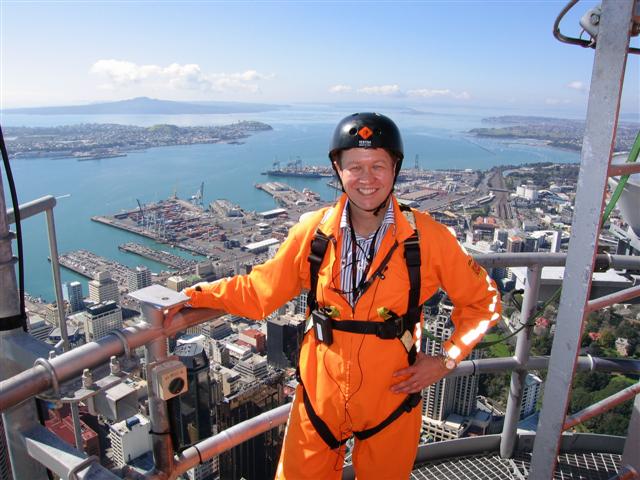 | Thank you for inviting me to your national day celebrations tonight here in the Croatian heartland of West Auckland....There has, of course, been a strong, successful Croatian presence in New Zealand for well over a century. |
|
Speech to Croatian National Day celebrations Tena koutou katoa, good evening, dobra vecer! Thank you for inviting me to your national day celebrations tonight here in the Croatian heartland of West Auckland. I bring you the greetings of the Prime Minister, Rt Hon Helen Clark, and the Minister of Ethnic Affairs, Hon Chris Carter. This evening you are marking the 16th anniversary on Monday of Croatia declaring independence in 1991 from the former Federal Republic of Yugoslavia. There has, of course, been a strong, successful Croatian presence in New Zealand for well over a century. The history of this part of Auckland is noted for the tenacity and foresight of the Croatian community, particularly in horticulture and especially viticulture. The names of the founders of the region's vineyards are a who's who of New Zealand wine Babich (founded in 1919), Selak (1934), Yukich (Montana Wines, 1944), Nobilo (1943) Delegat (1947) and Brakovich. Such names as Vella, Marinovich, Nola and Sunde are similarly renowned in the fruit-growing regions of Oratia and Henderson. In this nation built by immigrants from the arrival of the Maori in their great ocean-going waka a thousand years ago, Croatians have long been a small but historically significant community in New Zealand. Two months ago, many of you are likely to have seen the Television New Zealand documentary, "Here to Stay", which saw New Zealand rugby legend Frano Botica delve into his own heritage he has a Croatian grandfather and a Maori grandmother. This documentary was a reminder that not only do ties between Croatia and New Zealand go back a long way - but that these links help to make New Zealand the country it is today. Croatian Kiwis have not limited their contribution to wine, rugby and song. Isn't the 'Little General' of rugby league, Stacey Jones, a 'Tarara'? And his somewhat larger cousin, Shane, is doing pretty well in Parliament, continuing the tradition of Deputy Speaker, Hon Clem Simich, who is genuinely one of the most widely respected and well-liked members of the House. Other notable contributions include our own Victor Talyanacich, recently honoured with a Queens Service Medal for services to business and the community, and Monsignor Shanahan, who recently received the hugely prestigious Order of New Zealand for his 59 years of service as an unofficial chaplain to the Croatian community. In fact, I am told, he is contemplating changing his name to Shanacich. The Croatian Cultural Society, like its counterpart the Dalmatian Society, has made a great contribution to New Zealand. In recognition of this, on 1 July the prime minister is holding a major rally here in this building to celebrate the new benefits of KiwiSaver Plus and Working for Families. Immigration from Croatia For many decades, of course, the Croatian community was known to other Kiwis as the Dalmatians, or Dallies, from Dalmatia being the central Adriatic coastal region of Croatia. In the 1880s, when Croatians first came in numbers to New Zealand, the Austro-Hungarian empire ruled their homeland, which led to members of the community often mistakenly being called 'Austrians' in New Zealand, especially and sadly in World War One, when Austria was on the other side. After Austria-Hungary was defeated in 1918, Croatia was incorporated into the new Kingdom of Serbs, Croats and Slovenes. In 1929 this was renamed Yugoslavia. Only 20 years ago, few people in Europe or anywhere else, including New Zealand, thought in their wildest dreams that the then Communist-controlled states of Eastern Europe, including those making up Yugoslavia, were soon to become free and independent nations for the first time, for some, in centuries. It was the doggedness of the human spirit that drove the quest for independence in Croatia 16 years ago and it was that same spirit that drove the Croatian community in New Zealand in its early and often difficult days. Thousands of your country people came out to New Zealand to seek their fortunes as kauri-gum diggers in the Far North, but after the terrible hardships and sometimes outright discrimination they faced, many returned home. I have to acknowledge that the then-government of New Zealand, led by the Rt Hon R J Seddon, was not as welcoming as it could have been. The Kauri Gum Industry Act 1898 established kauri gum reserves exclusively for British subjects, and a licensing system with a three-month stand-down before Croatians could dig gum. Croatians only Croatians then had to be licensed as gumdiggers. Speaking personally and as one of King Dick's descendants, who now happens to be the Minister of Immigration, I believe that the Kauri Gum Industry Act was, by today's standards at least, not right. We have no differential laws on individual migrant communities and nor should we have. I understand this is a matter my colleague Hon Chris Carter is looking at, and I pledge my personal support to help set the record straight. In time, the land offered a better life for those who stayed, with some diggers becoming farmers in the north, fishermen on the Kaipara harbour and, of course, winemakers and orchardists in West Auckland. As Minister of Immigration, I was interested to learn that in 1926, the New Zealand government of the day introduced an upper limit of 3,500 to the number of "Yugoslavs" allowed in the country, after which only wives, fiances and young children could be admitted. For many years, about the only Croatians who immigrated were brides destined to marry men they had never met but seen only in photographs. Fortunately, such days are in the distant past. After World War II through to the 1970s, slow but steady migration resumed with some 3000 Croatians arriving in that period, and more arrived during the 1990s, fleeing the turmoil of the wars racking the Balkans as the Yugoslav Republic disintegrated. The 2006 census revealed that 2070 Kiwis were born in present-day Croatia and 2769 identified ethnically as Croatian or Dalmatian. And of course, many more people of Croatian descent are part of the great melting pot that is today's New Zealand. Visa processing change This means, of course, that many of you here tonight, and many Croatians and those of Croatian descent in New Zealand, have relatives in Croatia who will want to come here to visit family members. In the nine months to March 31, 105 Croatian nationals applied for visitor visas with a further 23 seeking work visas and 12 seeking student visas. There were a very few applications for residence. New Zealand does not have an embassy in Croatia. As many of you are well aware, visa applications from there must be sent to the New Zealand embassy in The Hague, from where they are sent to Wellington for processing. This can take a considerable time. I want to assure you that I have listened to your concerns about the immigration process for Croatian nationals applying to come to New Zealand. As a result, I am delighted to announce here tonight that changes are being made to the way that Croatian applications are managed From 1 July, all immigration applications from Croatian nationals will be processed much nearer to Croatia through Immigration New Zealand's London office, which is a major immigration centre. Croatian nationals will benefit from faster processing of applications and more certainty around application processing times. It is my understanding that decisions on routine visitor visa applications will be made within a fortnight of being lodged. This improvement to immigration services recognises the strong people-to-people links between New Zealand and Croatia. I hope these immigration processing changes encourage more Croatians to come and experience New Zealand and reinforce these ties. Once again, thank you for inviting me here tonight. Hvala lijepa. http://www.scoop.co.nz/stories/PA0706/S00475.htm http://www.beehive.govt.nz/Minister.aspx?MinisterID=70 (contact Hon David Cunliffe) Hon David Cunliffe dcunliffe@ministers.govt.nz Phone: 04 470 6667 Biography David is a Caucus representative on the Policy Council of the New Zealand Labour Party, where he convenes the party's Economic Policy Committee. In the previous government, David held the Communications and Information Technology portfolios, along with Associate roles in Revenue, Finance and State Owned Enterprises. He developed: Before Parliament 1995-1999: business economist and strategy consultant with the Boston Consulting Group, based in Auckland. He consulted in a wide range of industry sectors in New Zealand and Australia, including manufacturing, finance and agribusiness. Business School. David graduated with a Master of Public Administration in 1995.
Interests and Family David is married to Karen, an environmental lawyer. Together they have two sons, William, born 2001 and Cameron, born 2005. David's recreational interests beyond family and friends include keeping fit, sailing, gardening music and a love of the outdoors. He is an avid Auckland Blues fan. |
Formated for CROWN by Nenad Bach
Distributed by www.Croatia.org This message is intended for Croatian Associations / Institutions and their Friends in Croatia and in the World. The opinions / articles expressed on this list do not reflect personal opinions of the moderator. If the reader of this message is not the intended recipient, please delete or destroy all copies of this communication and please, let us know! Or simply...enjoy and spread the word and good vibrations

